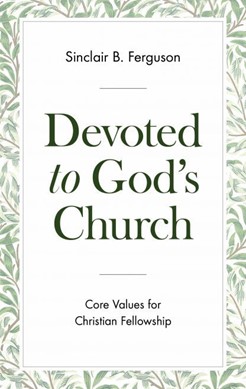Book Review: Devoted to God’s Church: Core Values for Christian Fellowship
<- Back
Devoted to God’s Church: Core Values for Christian Fellowship
Book Author: Sinclair B. Ferguson
Review Author: Emily
Mount Nasura Free Reformed Church
Pro Ecclesia Bookshop
Devoted to God’s Church: Core Values for Christian Fellowship, Sinclair B. Ferguson.
Banner of Truth, 2020
Paperback, 187 pages
“Each of us lives in a series of concentric spheres…family life…vocation…citizens in the context of society…and then if we are Christians, there is the church. How are these life-spheres related to one another in a well-ordered Christian life?” (p.5)
As the title suggests, Ferguson begins Devoted to God’s Church by asking this question and answers it by making a strong, biblical case for why the church should be absolutely central in the life of a Christian. He explains what the church is, what a Christian is, what being a disciple of Christ is, and what being a member of the church looks like. He follows the opening chapters with descriptions of worship and fellowship: the Bible and preaching, baptism, prayer, service to others, the Lord’s supper, and Christian witness.
Stylistically, Ferguson’s greatest strength is his biblical knowledge and expository teaching, made relatable through the use of experiential anecdotes, quotes from classic Christian poems, hymns and books, and references to church history. He uses language that is refreshingly understandable – he does not presume his reader’s intimate knowledge of Reformed confessions but certainly leans on what they teach.
In his introduction, Ferguson posits that the volume would be useful for someone wanting to know more about what it means to belong to the church. He does acknowledge that when used for this purpose, it will need to be accompanied by an explanation of how these principles are applied in a specific local church. Ferguson writes from his experience as a minister in the Free Church of Scotland and the Associate Reformed Presbyterian Church in the United States of America, each with their own church orders and traditions that do not translate exactly into those of other denominations. This does not take away from the book as a useful tool; rather, it can help to generate valuable discussion.
For example, in the chapter that explains what a Christian is, Ferguson uses an illustration where church leaders ask prospective members what being a Christian is, before admitting them as members in a public service with some ‘commitment questions’. We would need to contextualise this for someone interested in joining a congregation of the Free Reformed Churches of Australia by explaining our practices of pre-confession instruction and profession of faith, or aspects of church life such as attestations, and, dare I say it, church boundaries. What does remain the same in both contexts though, is the Christian’s profession that because we are saved from sin and made righteous by Jesus Christ, we want to love, know and serve him.
While not its primary purpose, Ferguson (and the blurb) also suggests that this book is a reminder for every Christian of what it looks like to belong to God’s family, something I found to be the case when I read it. I was especially challenged by how principles of worship were drawn from the experience of Isaiah when he was called as a prophet (Isaiah 6). I think that this book would be beneficial in a book study group, where the varied topics of each chapter would lead to different discussions each time, and where many of the subjects can challenge us personally and corporately to reappreciate what it means to belong to the family of God.
If there was one criticism I had to make, it would be Ferguson’s omission to elaborate on church discipline. By evaluating the book in light of the Belgic Confession’s summary about the true church, it is clear that it absolutely heralds the preaching of the Word as central, and there are two chapters on baptism and holy supper (described as ‘signs’). Ferguson also spends considerable time contending how important church membership is, comparing it to the rigour of a Scouts group and referring to the Bible as our “manual”, which we should value far more than a new Scouts recruit devours their membership rules. A failure to explicitly engage with church discipline could be justified by arguing that the book is supposed to be a positive way of looking at church membership (why talk about what happens if a member leaves, when they are just joining it?). However, I think that this important mark deserves some acknowledgement, if only to add extra gravitas to the case for church membership.
That said, I recommend that you buy yourself a copy of Devoted to God’s Church – engage with it yourself, share it with other church members, and look for opportunities to loan the book to people who wish to learn about what it means to worship and have Christian fellowship in God’s church.
Emily Van Der Plas, Mount Nasura

